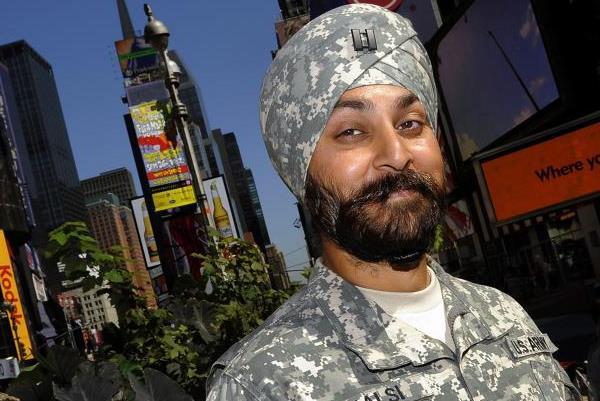More than two dozen retired Army and Air Force generals wrote a letter to Defense Secretary Ashton Carter, urging him to end the US military ban that prevents Sikhs from wearing the beards, long hair and turbans that are sacred to their faith.
But that hasn't persuaded the Pentagon's top civilian to change course.
A Pentagon official speaking to Military.com on background said there is no Defense Department policy on Sikhs or any other religious group to review.
"Our policies in this regard fall into two realms: religious accommodation and exceptions to policy for grooming standards, [including] exception requests for grooming standards based on religious accommodation," he said.
But the Defense Department issues standards that the individual services may interpret broadly and implement on their own, with no service bound by a decision made by another. And even within each service, the granting of one accommodation does not mean blanket authorization for everyone in that denomination.
Those interpretations were highlighted this month when the Army, for only the fourth time since 2009, authorized a Sikh -- Capt. Simratpal Singh -- to wear his beard, long hair and turban.
Harsimran Kaur, legal director for The Sikh Coalition, a civil and human rights group, said the policy remains discriminatory and that legal action may be necessary to make it happen.
"Comprehensive policy change is required to end religious discrimination by our nation's largest employer," she told Military.com on Thursday. "Women can now serve in combat roles, the ban on transgender soldiers has been lifted, Don't Ask Don't Tell has been repealed, but patriotic Sikh Americans still can't protect our country because of their faith?
"We hope the Pentagon willingly moves toward inclusion for all, but if we have to, we will take legal action to secure the right result," she said.
Sikhs were able to serve in the US military with beards, long hair and turbans from World War I until 1981, when then-Defense Secretary Caspar Weinberg instituted a ban. The Defense Department revised its instruction in 2009, striking language under the category of "religious apparel" that excluded "hair and grooming practices required or observed by religious groups."
That same year the Army commissioned a Sikh officer who was allowed to keep his beard, long hair and turban.
Matthew Allen, a Defense Department spokesman, said the Defense Department "does not endorse religion or any one religion or religious organization, and provides to the maximum extent possible for the free exercise of religion by all members of the [services] who choose to do so."
He added, "Each service has the authority to make determinations for religious accommodation. All requests for accommodation of religious practices are assessed on a case-by-case basis."
Accommodation requests are assessed on a case-by-case basis, he said, and should be approved by commanders when it will not adversely affect mission accomplishment, including in areas of readiness, unit cohesion, standards or discipline.
"The importance of and adhering to standards, and putting unit before self, needs to be carefully evaluated in each accommodation of religious practice decision," Allen said.
Amandeep Sidhu, partner at McDermott Will & Emery and the attorney who represented Singh, said he remains hopeful that the military "reconsiders the wisdom of maintaining the status quo, which presumptively discriminates against Sikhs who wish to serve our country.
"In light of the proof of concept that Sikh soldiers can meet rigorous safety and uniform standards, requiring each individual to endure a lengthy, cumbersome and uncertain administrative process to get 'permission' while serving is inconsistent with our values as Americans," he said.
--Bryant Jordan can be reached at bryant.jordan@military.com. Follow him on Twitter at @bryantjordan.





























